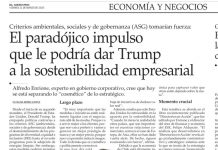Fuente: Directors & Boards
Autor: David Shapiro
As companies seek to understand and react to the particular ways in which the coronavirus pandemic may imperil their employees, operations and financial condition, there are certain key considerations that directors will likely be addressing as they, working together with management, support a variety of stakeholders through a time of unprecedented uncertainty. Among the key areas of focus for the directors are:
Assessing the risk. The pandemic has left almost nothing untouched, which means that almost every public company will need to decide what it is going to say about the impact of COVID-19 and when it is going to say it. In their recently published disclosure guidance, the staff of the SEC’s Division of Corporation Finance cautioned companies that “the effects COVID-19 has had on a company, what management expects its future impact will be, how management is responding to evolving events, and how it is planning for COVID-19-related uncertainties” is material information, which may need to be disclosed. Directors therefore need to understand the risks to the company and its stakeholders from the COVID-19 pandemic and discuss, as a board, management’s strategies for combatting and mitigating these risks.
Responding to the risk. Although the critical task of formulating and executing a response to the crisis is the job of management, directors need to carry out their oversight role to interrogate and refine management’s strategies. In light of the difficulty facing any attempt to predict the scope and duration of the crisis, directors need to regularly discuss how management’s plans are developing in response to changing circumstances. Management should review with the board the viability of the enterprise from short-, medium- and long-term perspectives in order to ascertain that corporate strategies are in place, with the board being updated as needed, to maintain that viability.
Maintaining liquidity. The board, in collaboration with management, should be receiving regular briefings on company indebtedness, including bank and bond financings, lines of credit, availability of revolvers and key covenant terms in order to understand the company’s near-term liquidity needs. As the size of the stimulus package demonstrates, liquidity will be a critical concern for many American businesses in the coming weeks and months, so the board will need to proactively oversee management’s efforts to secure liquidity needs.
Communicating with a unified voice. Directors need to appropriately message the company’s actions with respect to the crisis and provide the CEO and management with assistance in handling communication with internal and external constituents. In order to avoid confusion, directors and management need to speak with a single voice to a company’s employees, customers, investors and the wider world.
Maintaining open channels with regulators. Like everyone else, regulatory agencies are working hard to formulate effective responses to the pandemic. Many agencies have expressed an eagerness to speak to companies about the challenges they are confronting. Companies should maintain open channels of communications with their regulators in order to avoid surprises and seek guidance or regulatory relief as applicable.
Responding to strategic threats. In this midst of a shifting landscape, a number of activists and takeover raiders have sought to take advantage of the COVID-19 crisis by launching attacks on companies they view as vulnerable. The board should oversee management’s response to activist attacks or other actions by those seeking to take advantage of the current situation in order to promote their own agenda. Management may wish to use this opportunity to update the board on takeover tactics and potential responses, including reviewing the potential utility of a shareholder rights plan (also known as a poison pill). While the decision to implement a shareholders rights plan will be case-specific, there is a significant benefit to having a poison pill “on the shelf” so that it can be timely adopted under appropriate circumstances.
Taking advantage of strategic opportunities. Management should also brief the board regarding potential opportunities for transactions that may become available due to changed market circumstances. In times of crisis, there are often opportunities to pursue transactions that may fundamentally reshape a company’s industry and trajectory. There may be opportunities for companies with greater liquidity and flexibility to acquire businesses that are struggling to survive. It is to be hoped that a number of acquisitions in coming months will not only make strategic sense for the acquiring entities but also preserve the target businesses as ongoing concerns, to the benefit of stakeholders and beyond.
Promoting shareholder engagement. Directors should work with management in engaging shareholders and other stakeholders on corporate operations, impact to strategy, and other important concerns, including ESG issues such as climate change and sustainability. We and others have for years been signaling the alarm about the dangers posed to the economy by actors seeking short-term gain at the cost of long-term resilience. In the midst of our current economic crisis, the fragility caused by short-termism and activist hedge funds has elicited widespread demand for change. Large institutional investors such as BlackRock, State Street, Vanguard and others have made calls for corporations to resist financial engineering, pursue long-term strategies and embrace transparency.
Reviewing compensation plans. Directors should review compensation plans and work with management to consider whether changes are required, particularly with respect to equity arrangements, unforeseen employee cash needs, and mission-critical personnel. Given the significant erosion in stock prices, the board, together with its compensation consultant and senior management, should consider whether alternative arrangements are appropriate in the current circumstances.
Scrutinizing dividend and buyback policies. As part of its review, the board should work with management to evaluate the company’s current and future dividend and stock buyback policy as well as capital allocation and liquidity generally. Hedge fund activists have for years advocated short term shareholder interest above all and demanded that firms use available capital for stock buybacks and special dividends – and in many cases borrow money to do so. Backed by proxy advisors ISS and Glass Lewis, these funds pressured companies to abandon programs of long-term investment in research, technology and people and to pare back “rainy day” cash reserves. The current crisis is an opportune time to adopt the sort of stakeholder-centric governance principles described by the International Business Council of the World Economic Forum in their 2016 publication, The New Paradigm: A Roadmap for an Implicit Corporate Governance Partnership Between Corporations and Investors to Achieve Sustainable Long-Term Investment and Growth.
Increasing communication. Directors need to maintain frequent communication with senior management teams. Executive officers should be reassured and reminded that there is no higher priority at times such as this than the safety and well-being of a company’s employees, a company’s other stakeholders and the public at large.
Maintaining respect. In the midst of stressed and stressful conditions, directors and management must maintain an atmosphere of mutual respect in order to promote effective decision-making under conditions of great uncertainty.












